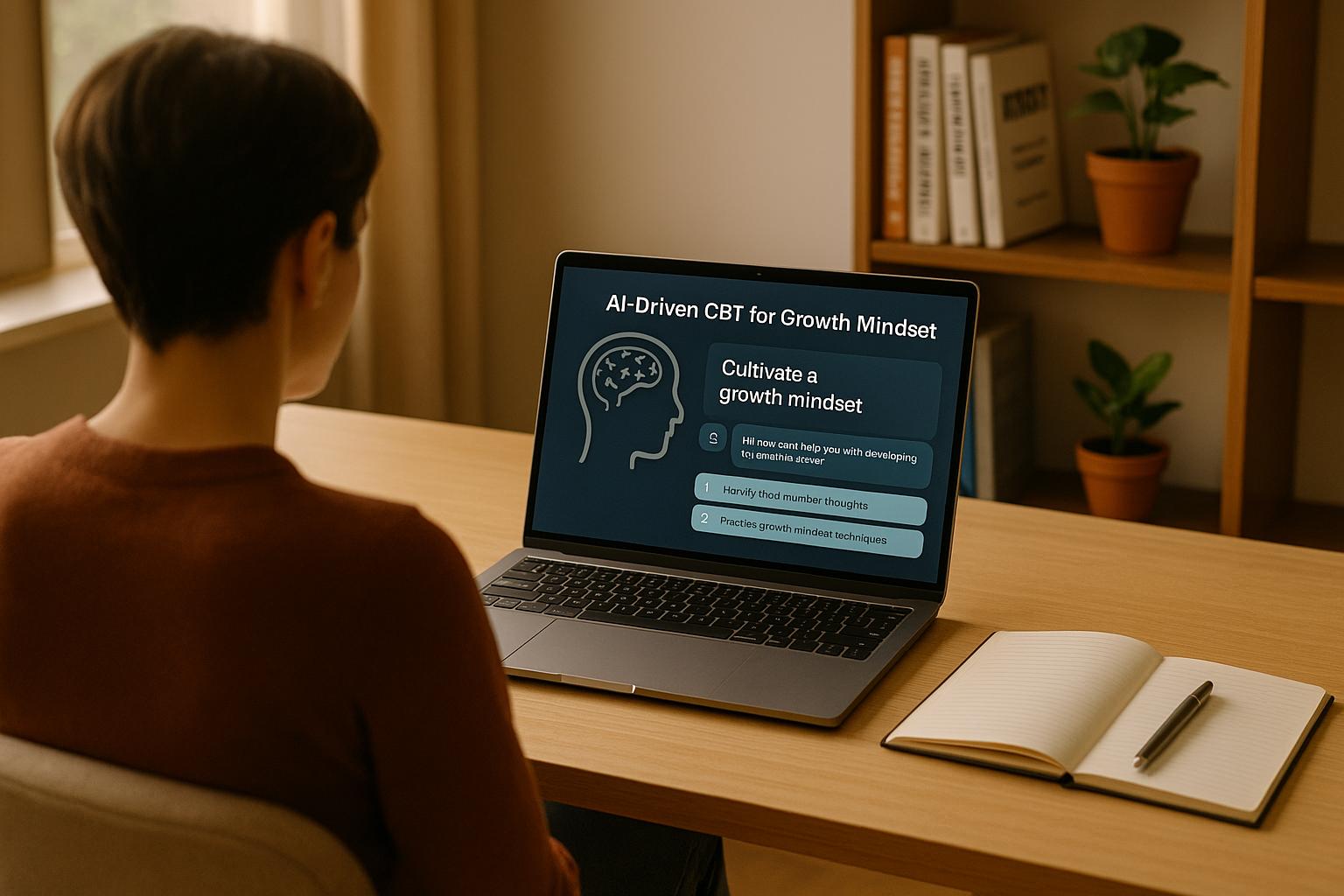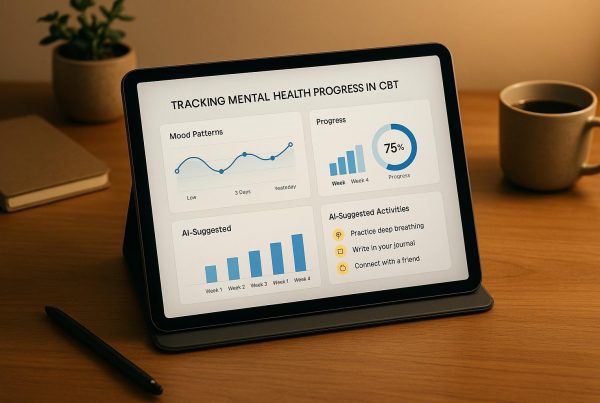AI-powered CBT merges proven therapy techniques with advanced technology to help you build a growth mindset – believing that abilities can improve with effort. These tools make mental health support available anytime, offering strategies like reframing negative thoughts, setting goals, and overcoming challenges. Platforms like Aidx.ai provide personalized, real-time guidance, helping users manage emotions, reduce anxiety, and turn setbacks into learning opportunities.
Key Takeaways:
- Growth Mindset: The belief that intelligence and skills can improve through effort.
- CBT Basics: Focuses on changing negative thoughts to improve emotions and behaviors.
- AI Benefits: Offers 24/7 support, tracks progress, and provides tailored interventions.
- Applications: Useful in education, workplaces, and therapy to improve performance and resilience.
AI-driven CBT makes mental health tools more accessible and practical, helping individuals thrive in everyday life.
How Does CBT Use Growth Mindset To Reduce Fear Of Failure? – CBT Toolkit

Growth Mindset Impact on Mental Health and Well-Being
Adopting a growth mindset can have a profound effect on mental health, helping individuals better regulate their emotions, build resilience, and approach challenges with a more positive outlook. Let’s explore how this mindset contributes to mental well-being, enhances performance across various environments, and equips people to face difficulties head-on.
Mental Health Benefits of a Growth Mindset
Studies reveal that adopting a growth mindset – believing that abilities and intelligence can be developed – can reduce psychological distress. People with this perspective often experience lower levels of anxiety and depression compared to those with a fixed mindset. This shift in thinking encourages reframing negative emotions, viewing them as chances to grow rather than insurmountable barriers. In essence, it transforms setbacks into stepping stones for personal development.
Growth Mindset in Education, Work, and Therapy
The benefits of a growth mindset extend across multiple settings:
- Education: Students who embrace a growth mindset tend to perform better academically. They see challenges as opportunities to improve rather than as threats to their self-worth.
- Workplaces: Teams that encourage growth-oriented thinking often see increased collaboration and a greater willingness to accept constructive feedback.
- Clinical Environments: In therapy and treatment, a growth mindset can enhance engagement, helping individuals adopt effective coping strategies and stick with their care plans.
Across these environments, the common thread is the ability to embrace challenges and learn from them, leading to better outcomes.
Tackling Challenges with a Growth Mindset
When faced with difficulties, those with a growth mindset are more likely to view obstacles as opportunities to learn and grow. This perspective helps them navigate challenges without being weighed down by self-doubt or fear of failure. By seeing setbacks as temporary and surmountable, they develop stronger emotional regulation and reduce the stress that often accompanies self-criticism.
There’s also emerging evidence that a growth mindset can influence the body’s response to stress. People with this mindset tend to recover more quickly from stressful events and adopt healthier behaviors, further reinforcing their mental and emotional resilience. Over time, each successfully managed challenge builds confidence, creating a foundation for handling future stressors with greater ease and adaptability.
How AI-Driven CBT Builds Growth Mindset
AI-powered cognitive behavioral therapy (CBT) tools are changing the way people cultivate a growth mindset by making evidence-based strategies more accessible and personalized. These tools blend proven therapeutic methods with advanced technology to create interactive, tailored experiences that match each individual’s needs and learning style. This customized approach serves as the foundation for the techniques discussed below.
CBT Techniques for Growth Mindset Development
AI systems bring several key CBT techniques into play, all aimed at encouraging growth mindset thinking. One such technique is Socratic questioning, which uses structured, thought-provoking questions to challenge negative beliefs about abilities. Instead of simply urging users to "stay positive", these tools ask targeted questions like, "What proof do you have that you can’t improve this skill?" or "How might someone successful in this area have started their journey?"
Another powerful tool is mental contrasting, which helps users visualize their goals alongside the challenges they might face. This technique encourages realistic planning by guiding users to identify specific objectives, imagine achieving them, and then strategize ways to overcome potential obstacles.
AI also simplifies implementation intentions, or "if-then" plans, by breaking them into clear, actionable steps. For instance, the system might suggest, "If I struggle with this task, then I’ll remind myself that challenges are part of learning and try a new approach."
What makes AI particularly effective is its ability to deliver these techniques exactly when users need them. Unlike traditional therapy, which often involves weekly sessions, AI platforms can step in during moments of self-doubt or frustration, offering real-time support.
Personalized AI Support Systems
The most advanced AI-driven CBT platforms use adaptive algorithms to fine-tune their methods based on each user’s unique preferences and behavior. These systems go beyond basic customization by learning how users communicate, what motivates them, and how they respond to different interventions. For example, Aidx.ai‘s Adaptive Therapeutic Intelligence (ATI) System™ adjusts its approach over time, tailoring its feedback to each user’s emotional patterns and communication style.
This level of personalization ensures that interventions are as effective as possible. Some users may respond best to logical, data-focused questions, while others benefit more from emotionally driven explorations of their thought patterns. AI systems adapt to these differences, ensuring each user gets the type of interaction that resonates most.
The ability to adjust communication style is key. A user who prefers direct, to-the-point feedback will receive it that way, while someone who enjoys a more conversational, exploratory approach will experience a different, yet equally impactful, interaction. Voice-enabled interfaces add even more flexibility, allowing users to engage with growth mindset training during everyday activities like commuting, exercising, or relaxing, all through natural dialogue.
Accessible Growth Mindset Training at Scale
Traditional CBT can be time-consuming and expensive, often making it inaccessible for many who could benefit. AI platforms eliminate these barriers by offering 24/7, affordable, and location-independent access to growth mindset training. Whether someone lives in a bustling city or a remote rural area, they can access the same high-quality resources through a smartphone or computer.
The scalability of AI means these evidence-based techniques can reach thousands of users at once without sacrificing quality. Each individual still receives personalized interventions, something that’s hard to replicate in traditional one-on-one therapy settings.
AI’s consistency ensures that every user benefits from expertly delivered techniques tailored to their needs. And because these systems can intervene during real-life challenges, they offer a unique opportunity to build a growth mindset in the moments it matters most. This combination of accessibility, real-time support, and personalized guidance makes AI-driven CBT a game-changer for growth mindset development.
sbb-itb-d5e73b4
Research Results: AI-Driven CBT Tool Effectiveness
Recent studies highlight the potential of AI-powered CBT (Cognitive Behavioral Therapy) platforms in encouraging a growth mindset and supporting therapeutic progress. These tools provide actionable, evidence-backed insights into the processes that help individuals develop and maintain a growth-oriented perspective.
User Experience and Satisfaction Data
The research findings are echoed in users’ feedback. Many studies report high levels of satisfaction with AI-driven CBT platforms, emphasizing their round-the-clock availability and supportive nature. Users appreciate the consistent quality of interactions, which they find to be a dependable source of help. Features like voice-enabled functionality offer a hands-free, intuitive experience, making it easier to use while multitasking. This smooth interaction design helps create a safe space for users to express their thoughts, encouraging honest self-reflection and deeper engagement with growth mindset principles.
Improvements in Emotional Control and Goal Achievement
Beyond user satisfaction, research connects these platforms with noticeable improvements in emotional regulation and achieving personal goals. Users report being better equipped to identify and reframe negative thought patterns. Tools for planning and progress tracking further assist individuals in setting and reaching their objectives. The real-time support offered by these platforms appears to enhance users’ ability to manage emotional responses during challenging situations, contributing to stronger emotional resilience and self-awareness.
Current Limitations and Research Gaps
Despite the promising outcomes, there are still challenges to address. AI-driven CBT tools often struggle with handling complex emotional situations that require deep empathy and nuanced understanding – areas where human therapists excel. For some users, human intervention remains essential, especially during crises or for addressing deeply rooted emotional issues. Another concern is maintaining long-term user engagement, as a decline in usage over extended periods has been observed. Additionally, factors such as cultural and demographic differences influence how effective these tools are, pointing to the need for more research. Future studies should aim to determine the best ways to combine AI and human support while also evaluating how long-lasting the growth mindset changes are.
These findings highlight the potential of platforms like Aidx.ai, which utilize advanced, voice-enabled, and personalized AI-driven CBT techniques to encourage growth mindset development. They also pave the way for exploring how future advancements can further improve the impact of AI-driven CBT on personal growth and emotional well-being.
The Future of AI-Driven CBT for Growth Mindset
Recent research is uncovering exciting ways that AI-driven cognitive behavioral therapy (CBT) could transform personal development and mental health support. Early findings suggest these platforms might offer more accessible and tailored growth mindset interventions than traditional approaches.
Building on current achievements, future solutions aim to refine these capabilities even further. Advanced AI tools are expected to anticipate users’ needs in real time, delivering a more personalized experience. Meanwhile, voice-enabled technologies promise to make hands-free interactions smoother, effortlessly integrating support into daily life.
A particularly promising development is the rise of hybrid care models. These combine AI-driven routine check-ins with professional therapy, offering a balanced approach that complements, rather than replaces, human intervention. This blend could redefine how support is delivered, ensuring timely help while maintaining a human touch.
The scalability of digital platforms also holds the potential to reach wider audiences, including communities that previously had limited access to growth mindset training and therapeutic resources. However, keeping users engaged over the long term remains a critical challenge for researchers to tackle.
Given the sensitive nature of personal data these platforms handle, advancements in privacy and security are essential. Features like advanced encryption, optional incognito modes, and clear data policies will play a key role in building user trust and meeting regulatory standards.
Looking further ahead, researchers may explore how well AI-driven CBT adapts to different cultural contexts and its effectiveness over time. As therapeutic techniques evolve and AI continues to enhance personalization and scalability, these tools could become central in schools, workplace wellness programs, and healthcare systems.
Together, these developments point to a future where AI-driven CBT plays an increasingly important role in mental health and personal growth. By focusing on adaptive, user-centered interventions, these systems will empower individuals to embrace and sustain a growth mindset in meaningful ways.
FAQs
How does AI-driven CBT help in building a growth mindset compared to traditional methods?
AI-powered CBT takes a fresh approach to fostering a growth mindset by delivering customized guidance based on an individual’s emotional and cognitive tendencies. Unlike standard CBT, which typically follows a fixed framework, AI adapts in real time, learning from each user’s interactions. This allows it to offer feedback and strategies that evolve alongside the user’s journey.
The flexibility of this method makes the experience more engaging and approachable, enabling users to adopt positive thought patterns and build resilience more naturally. By weaving growth-focused beliefs into everyday experiences, AI-driven CBT helps users shift their mindset in a way that feels intuitive and uniquely suited to their needs.
What are the challenges of using AI-driven CBT tools for complex emotional issues, and how can human support enhance their effectiveness?
AI-based CBT tools are great at delivering structured, evidence-based techniques, but they often fall short when dealing with the complexities of human emotions. These tools operate on algorithms and general patterns, which means they can overlook the subtle, subjective nature of individual experiences.
For a more well-rounded approach, it’s a good idea to pair AI tools with guidance from licensed therapists or mental health professionals. Human therapists bring empathy, deeper emotional understanding, and personalized advice to the table – qualities that are especially crucial for navigating severe or intricate emotional struggles. Combining the efficiency of AI with the expertise of a professional can lead to a more effective and balanced path toward mental health and personal growth.
How does Aidx.ai personalize AI-driven CBT to improve growth mindset development?
Aidx.ai takes growth mindset training to a new level by personalizing the experience for each user. By analyzing emotional patterns, preferences, and communication styles, it delivers exercises, strategies, and feedback that feel relevant and engaging. This tailored approach makes it easier for users to truly embrace and apply growth mindset principles in their everyday lives.
What sets Aidx.ai apart is its ability to provide real-time, customized support. As users progress, the system adapts to their needs, offering guidance that grows alongside them. This dynamic approach not only helps build resilience but also encourages meaningful personal development with lasting results.



